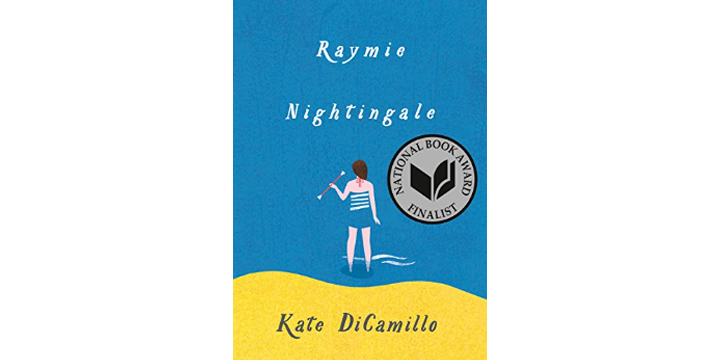I had two different friends tell me about Raymie Nightingale. Each cautioned me that the book begins slowly. Their warning actually gave me hope. I’ve never been afraid of a slow start. In my experience a slow start has often led to hidden treasure. This proved true once again.
In the case of Raymie Nightingale the ‘slow start’ begins with three girls taking their first baton twirling lesson from a middle-aged woman desperately trying to hang on to the baton twirling glory days of her youth. Each girl is there for the same reason, and yet they have very different motivations. They are all contestants in the 1975 Little Miss Central Florida Tire contest and believe that knowing how to twirl a baton is critical to winning that title.
Raymie’s motivation is to win and get her picture in the paper. Then maybe her Dad, who has run away with the dental hygienist, will see her picture and come back. Louisiana wants to win the $1,975 in prize money so that she and her grandmother can buy food. Beverly, who already knows how to twirl a baton, doesn’t actually want to win—she confides that what she really wants is to sabotage the contest. The lesson ends before it gets started when Louisiana faints. The girls depart the lesson in three very different frames of mind. To my reading there is nothing at all slow about this start. It is a clever, engaging meeting of three disparate girls—strangers to each other—who find that their lives overlap and are now entangled.
Raymie is the straight girl. She is struggling with the fact that, on June 3rd, two days before the story begins, her Dad abandoned her and her mother for a dental hygienist. Raymie simply wants him back. The story revolves around her perceptions as she tries to make sense of a world suddenly turned upside down.
Louisiana is an orphan. She’s sweet, innocent, and powerfully optimistic even though she lives with a grandmother who teaches her how to steal tuna from the store so they can have something to eat. When Louisiana’s grandmother tells her that they can’t afford to feed her cat, Archie, and that they need to take him to The Very Friendly Animal Center where they’ll take good care of him, Louisiana believes her.
Lousiana’s seeming innocence floats atop a dark ocean.
“I have a lot of fears,” she says, after fainting at the beginning of the baton twirling lesson. She goes on to ask a question. “Have you ever, in your life, come to realize that everything, absolutely everything depends upon you?”?”
Beverly is the tough girl. Her Dad is a cop. She makes sure the other girls know this when she first meets them.
“Hi. My name is Beverly Tapinsky. My Dad is a cop so I don’t think you ought to mess with me.”
Only later will her new companions find out that her father the cop is a cop in a city many states away. She’s the bitter and jaded to Louisiana’s sweetness and optimism.
To Louisiana’s question Beverly’s answer is simply “Duh.”
Raymie, on the other hand, takes the question as a significant revelation of truth. “Yes,” she says, and goes on to feel “something expanding inside her, billowing out like a tent. This, Raymie knew, was her soul.”
The broken lives of these three girls mix like currents and eddies in a river—unpredictably, yet sure and steady. The strengths of one may irritate or confuse the others, yet that strength is the savior of the moment. Each girl has her moments.
The girls are never well defined physically. There is nothing to suggest that any of them is physical attractive. DiCamillo may not let us see what they look like on the outside, but she gives a much clearer picture of their souls. Girls like these are best read about in books. In real life their presence would worry us the way undisciplined children in the grocery store do. We would never really see them because we would be too anxious to see them leave the store. In the book we see them more like God does, through the annoying surface trivialities down to the beauty of their souls.
The book’s subtle, but powerful, climax sees Raymie and Beverly chasing a runaway shopping cart, in which Louisiana rides, down a hill. “Oh my goodness,” says Louisiana when she sees where she’s going. Looking back at the girls who are fast falling behind she adds sweetly, “Goodbye.”
It’s laughable. It’s serious. It leads to an ending that some might say isn’t an ending at all, just another beginning. But it is a satisfying beginning full of strength and hope—the kind of beginning that carries me onward like the prospect of a beautiful summer day.

